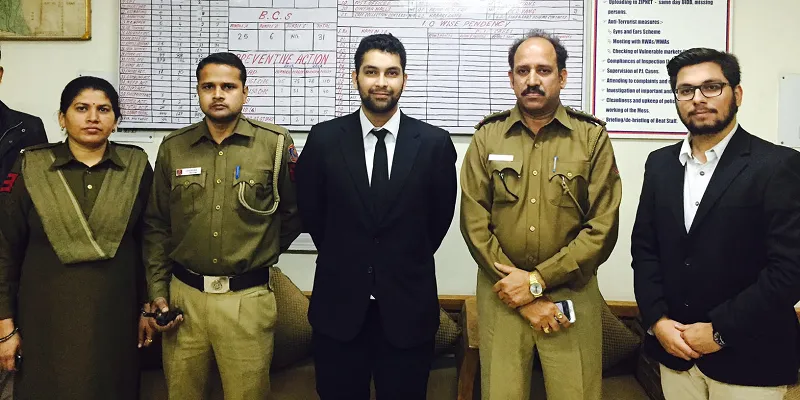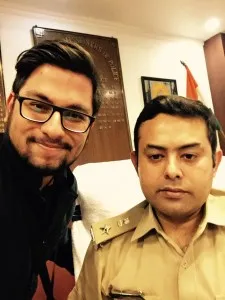Meet the organisation that simplifies India’s legal system for the common man
Kafka’s unfinished novel ‘The Trial’ has a section where a man awaits entrance into the gate of law. “The law should always be accessible for everyone, he thinks.” The gatekeeper, however, keeps him waiting until he dies as the gate closes in a nightmarish havoc.
In reality, the legal system is probably not as bad. Or is it? With more than 3 crore pending court cases across the country – nearly 65,000 with the Supreme Court itself – it is a tough claim to make that legal justice in India is easily accessible.
In such a situation, it becomes important for citizens to understand the legal system that governs them. With the lawyers constantly acting as ‘gatekeepers‘, guarding the path to justice with their legalese, here is a group of young law students simplifying India’s legal system for the common man.

Nishant Gambhir is a final year student of a law college in Noida. He was constantly approached by friends and family members with legal questions. These questions typically varied – know how to queries on Right To Information (RTI) and Public Interest Litigation (PIL) filing. Nishant recalls,
“They asked me simple questions like ‘what do I do if my mobile phone is lost?’ And that bothered me. Our legal system, which is there to help, is believed to be so complex that most people want to avoid it completely, and either pay bribes or settle things among themselves instead of following the legal path. Many of my friends didn’t know their basic rights. What good are these rights if people are not aware of them?”
It all started very informally, with Nishant and his friends going to villages around their law school and helping people in district courts. What led to making things formal was the realisation that the information gap, which exists between the providers and seekers of justice, was huge.
In 2014, Nishant and his friend Eklavya Dahiya started Lex Do It, a social and educational non-profit enterprise which aims to educate and empower citizens by providing free legal assistance. The group conducts awareness campaigns about basic legal rights and generously uses technology in spreading awareness about solutions to most common legal hurdles faced by everyone.
Lex means Law in Latin. The young energetic group wants to disrupt the way law is perceived and wants to get things done through empowerment, education, better governance, and greater justice in our society.
They have been actively running a couple of campaigns inclined to their goal. One of their campaigns ‘Know Your Rights’ is a digital and offline campaign which educates the common man about his rights. They use videos, illustrations, and one liners in doing so. The campaign includes a law handbook in both Hindi and English which explains legal jargon in a language everyone can understand. They are also working on a web series of 50 videos, listicles, and guides on tackling law in the life of the everyday man – from how to deal with traffic policemen, to what needs to be done if a government official demands a bribe.

One of their campaigns, Know Your Guardians, is focussed on helping to bridge the gap between the common man and the guardians of the legal system – that is, the policemen and lawyers. Nishant says –“Most people believe that the whole system is corrupt. But we rarely realise the amount of work they do and the mental and physical stress they are under. We have created a series of documentaries on agencies, which are out there taking care of people and making a difference. These documentaries follow their lives without being judgmental and let the viewers decide the side of lawyers and policemen, which is usually not shown in cinema or media.”
Under the campaign, three documentaries are currently under production. One focuses on the life of a Delhi policeman, whereas the other is about how the Delhi Government has been reinventing governance. The third documentary is about the legalities that followed the Delhi Uber rape case. Nishant adds,
“Legal process is tedious. It comes with a lot of stress for everyone involved. If you have a court case against a family member, it will probably spoil your mental health. This is the reason we have a mental health arm as part of which we have industry experts training volunteers to counsel those in need of assistance. This team also provides medical help to policemen, who are always under a lot of stress.”
They have also been running Lex Insider, a new age publication which decodes law for everyone through public participation. The publication encourages young authors and legal professionals to express and share their views with everyone. It is currently being run as an online portal. The organisation is also in the process of publishing two books.
The organisation is also rolling out their next programme called Lex Guardians, which will provide classroom certifications to young professionals and seasoned students on basics rights and legal processes, thereby extending their envelope. The first batch of 30 will begin in early 2016.
When asked about the future, Nishant says that they are not here to make money. Even after completing their studies, they want to run Lex Do It as a full time non-profit enterprise which works closely with the legal system and continues what it is currently doing. He hopes that funds from the government and concerned people will come along the way, which he sees as bonus. Nishant’s enthusiasm is infectious as he says,
“We want to help the poor and marginalised because they are the most vulnerable. This will eventually lead to the formation of a bottom up robust legal system and bring good governance for all. We also want to get involved in policy making. I believe we are doing the right thing, because the best way to ensure justice is to empower the people who demand it.”
Website – www.lexdoit.org
Email – lexdoit.india@gmail.com
Read More :
Two lawyer sisters and their Lawtoons: a comic series on laws for children
Labour All – Bangalore lawyer develops software for labour law compliance
How a lawyer is organising people from 400 villages to protect their river in Gandhian style







